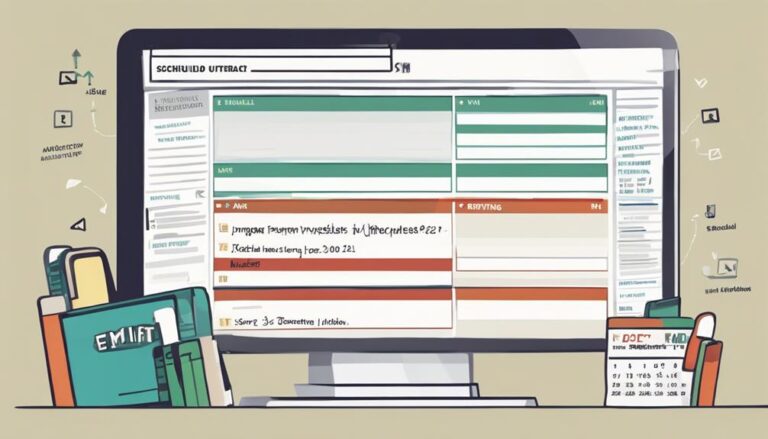
When it comes to automated link building tools, it's like chasing a mirage in the desert – promising quick results but often leaving you parched.
The allure of convenience can quickly turn sour when these tools fail to deliver sustainable benefits for your online presence.
Before you commit to relying solely on automation, consider the pitfalls that may await you in this digital landscape.
Key Takeaways
- Automated tools risk low-quality backlinks and Google penalties.
- Impersonal outreach hinders trust and credibility building.
- Quantity-focused automation may lead to SEO penalties and deindexing.
- Long-term SEO success relies on natural links and credibility maintenance.
Limited Link Quality Control
Limited link quality control in automated link building tools exposes websites to potential risks and drawbacks associated with low-quality backlinks. When utilizing automated link building tools, there's a significant concern regarding the generation of quality links. The inability to monitor and ensure the quality of links created by these tools can result in a link profile filled with irrelevant or spammy backlinks, ultimately diminishing the overall link profile quality.
One of the critical issues stemming from the lack of quality control is the heightened risk of receiving Google penalties. The presence of unnatural or irrelevant backlink patterns, often produced by automated tools, can trigger penalties from Google, impacting the website's search engine rankings negatively. Additionally, the absence of manual oversight means that the links generated may not align with the website's niche or target audience, affecting the SEO effectiveness of the link building strategy.
It's essential to prioritize link quality and actively manage the link profile to maintain credibility and trustworthiness with search engines and users.
Lack of Personalization in Outreach
When automated tools send out generic outreach messages, they often lack the personal touch needed to establish genuine connections with potential link partners. This impersonal approach can lead to automated responses that feel robotic and fail to resonate with recipients on a human level.
Without the human touch in outreach efforts, the chances of building meaningful relationships and securing high-quality backlinks diminish significantly.
Generic Outreach Messages
Crafting personalized outreach messages is crucial for successful link building campaigns. Generic messages often result in low engagement rates and missed opportunities for valuable backlinks. When outreach lacks personalization, recipients are less likely to respond positively, diminishing the chances of acquiring backlinks.
Personalized messages tailored to the recipient's specific needs and interests have a higher response rate and are more likely to lead to successful link placements. On the contrary, automated tools frequently generate generic outreach messages that lack the necessary personal touch, potentially causing recipients to disregard them as spam.
To enhance your link building efforts, invest time in crafting individualized outreach messages that demonstrate authenticity and sincerity. This approach increases the likelihood of securing valuable backlinks.
Impersonal Automated Responses
To maximize the effectiveness of your outreach efforts, it's crucial to recognize the drawbacks of using automated link building tools that often result in impersonal responses lacking the necessary personalization. Automated link building tools frequently employ generic templates for outreach emails, leading to impersonal outreach that fails to establish a connection with recipients.
Research shows that personalized communication yields a higher response rate compared to automated, generic messages. Furthermore, the lack of personalization in outreach can result in recipients showing disinterest or even marking your emails as spam.
Lack of Human Touch
The absence of personalization in outreach efforts using automated link building tools diminishes the authenticity of communication with potential link partners, hindering the establishment of genuine relationships. Automated tools often rely on generic templates for outreach messages, lacking the human touch necessary to tailor pitches to the specific needs and interests of individual websites.
This impersonal approach neglects the crucial element of personalization, which is essential for building trust and credibility with potential partners. Genuine relationships are fostered through personalized interactions that demonstrate a sincere effort to understand and address the unique characteristics of each website.
Without this personal touch, automated tools struggle to create meaningful connections that are vital for successful link building campaigns and acquiring high-quality backlinks.
Risk of Unnatural Link Patterns
When automated tools create unnatural link patterns, they pose a significant risk to your website's SEO health. Google's algorithms can swiftly detect these patterns, leading to penalties that harm your site's visibility.
It's crucial to prioritize quality over quantity in your link building efforts to avoid falling victim to these penalties.
Unpredictable Algorithm Changes
Amid the ever-evolving landscape of search engine algorithms, the risk of unnatural link patterns looms as a persistent threat to websites utilizing automated link building tools.
- Unpredictable algorithm changes can penalize websites with manipulated and artificial backlink profiles.
- Automated link building tools may inadvertently create unnatural link patterns that violate search engine guidelines.
- Websites risk algorithmic penalties due to rapid link acquisition through automation.
- Ensuring natural link growth and monitoring link patterns is crucial to avoid penalties and maintain website visibility and rankings.
Negative SEO Impact
Due to the risk of unnatural link patterns, websites utilizing automated link building tools face potential negative SEO impacts, including penalties from search engines like Google. When automated tools generate rapid link growth without natural diversity, they can trigger Google's algorithmic filters, signaling suspicious link patterns.
Unbalanced anchor text distribution, often a result of automated practices, can further raise red flags for search engines. Google's algorithms are adept at detecting these irregularities, penalizing sites that exhibit such behavior.
Consistent use of automated tools not only undermines the credibility and authority of a website but also increases the likelihood of being flagged for engaging in manipulative SEO tactics. It's crucial to prioritize organic link building strategies to avoid the pitfalls associated with automated link building tools.
Potential for Penalties From Google
Google imposes penalties on websites that utilize automated link building tools, primarily because of the creation of unnatural backlink patterns. When you resort to automated tools for link building, you run the risk of violating Google's guidelines, which can have severe consequences for your website. Here's why automated link building tools may lead to penalties:
- Unnatural Backlink Patterns: Automated tools often generate numerous backlinks in a short period, creating patterns that are unnatural to search engines like Google.
- Decrease in Ranking: Websites that use automated tools may witness a decline in their ranking as Google penalizes them for manipulating backlinks.
- Violation of Google's Guidelines: By using automated link building tools, you may inadvertently violate Google's guidelines, inviting penalties that can harm your online presence.
- Lack of Control Over Quality and Relevance: Automated tools may generate backlinks from irrelevant or low-quality sources, which can further flag your website for penalties.
To safeguard your website's reputation and ranking, it's crucial to steer clear of automated link building tools and focus on organic and natural link building strategies.
Inability to Adapt to Algorithm Changes
Adapting to the frequent changes in search engine algorithms poses a significant challenge for automated link building tools. With search engines like Google constantly refining their algorithms, automated tools often struggle to keep up with the evolving requirements for effective link building strategies. Failure to adjust to these algorithm changes can have severe consequences, potentially leading to penalization from search engines. Sites that are penalized may experience a significant drop in visibility and traffic, ultimately hindering their online presence.
To remain effective and compliant with search engine guidelines, automated tools must undergo constant monitoring and updates. The inflexibility of these tools in adapting to algorithm changes not only puts websites at risk of penalties but also jeopardizes the long-term success of their link building strategies. It's crucial for website owners and digital marketers to stay informed about algorithm updates and ensure that their automated tools are equipped to adapt accordingly.
Challenges in Building Relationships
When relying on automated link building tools, the challenge of building meaningful relationships surfaces due to the lack of personalization and human touch in outreach efforts. This can hinder the establishment of authentic relationships with other websites, impacting the overall success of your link building strategy.
Here are some key reasons why automated tools fall short in building relationships:
- Lack of Personalization: Automated tools can't tailor outreach messages to individual site owners, leading to generic and impersonal communication.
- Absence of Human Touch: The automated nature of these tools limits genuine communication and interaction with site owners, hindering the development of trust and collaboration.
- Focus on Quantity Over Quality: Automated link building tools prioritize quantity, neglecting the importance of fostering deep and authentic relationships for long-term success.
- Need for Manual Effort: Establishing meaningful connections with other websites requires manual effort and personalized communication that automated tools can't replicate effectively.
To overcome these challenges, consider investing time and effort into personalized outreach strategies that prioritize building genuine relationships for sustainable link building success.
Difficulty in Earning High-Quality Links
Struggling to earn high-quality links becomes a common challenge when utilizing automated link building tools that prioritize quantity over quality. Automated tools often fail to establish genuine relationships with authoritative sites, leading to the acquisition of low-quality backlinks. Google's algorithms heavily favor natural and high-quality links, which automated tools may not effectively generate. The absence of personalized outreach in automated tools further complicates the process of developing valuable and relevant links. Consequently, users may find themselves disappointed by the high volume of low-quality backlinks produced by these tools, as they do not significantly contribute to SEO success.
| Challenges with Automated Link Building Tools | |
|---|---|
| Emphasis on quantity over quality | Struggles to establish genuine relationships |
| Difficulty in acquiring high-quality links | Lack of personalized outreach |
| Google's algorithms prioritize quality links | Disappointment with low-quality backlinks |
Issues With Link Relevancy
Lack of link relevancy presents a significant challenge when using automated link building tools, impacting the effectiveness of your SEO strategy and potentially harming your website's credibility with search engines. Here are some key points to consider:
- Automated Backlinking: Automated tools often create backlinks without considering the relevance of the linking site to your content, leading to a higher chance of irrelevant links.
- Link Schemes: Relying on automated tools can inadvertently make your website a part of link schemes, as the generated links may lack context and value.
- White Hat SEO Strategies: Embracing white hat SEO practices involves focusing on relevant link building, which automated tools may struggle to achieve consistently.
- Domain Authority (DA): The lack of link relevancy can negatively impact your website's Domain Authority, as search engines prioritize quality and contextually relevant backlinks for determining website credibility.
Impact on Long-Term SEO Success
The utilization of automated link building tools can have a profound impact on the long-term success of your SEO strategy. These tools, while promising quick results, often lead to a decrease in website authority and domain trust over time.
The risk of incurring Google penalties due to unnatural backlink patterns can result in long-term consequences for your brand reputation. Recovery from such penalties is challenging and can significantly impede your online visibility and overall SEO success.
Moreover, the negative effects of using automated link building tools extend to website credibility and trustworthiness, which are crucial for long-term sustainability in search engine rankings. The possibility of being deindexed from search engine results pages further underscores the detrimental impact these tools can have on your long-term SEO strategy.
It's essential to consider these factors carefully to avoid jeopardizing your brand's online presence and reputation.
Can Any Automated Link Building Tools Actually Deliver Results?
Many marketers wonder if top automated link building tools can actually deliver results. While these tools can help streamline the process of acquiring backlinks, it’s important to use them with caution. Employing a mix of manual outreach and automated tools often yields the best results in building a strong backlink profile.
Conclusion
In conclusion, automated link building tools may not always live up to expectations due to various challenges such as limited control over link quality and the risk of penalties from search engines.
It's advisable to prioritize manual link building strategies to ensure sustainable results and avoid potential setbacks in online visibility and credibility.
By understanding the drawbacks of automated tools and focusing on building genuine relationships, you can navigate the complexities of link building successfully.


